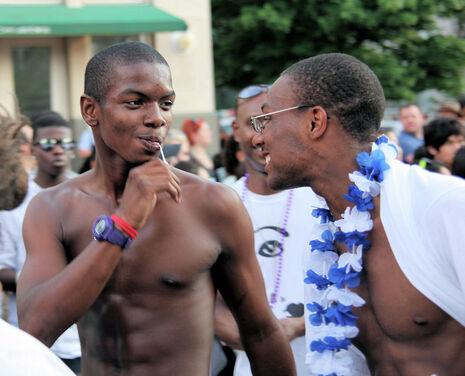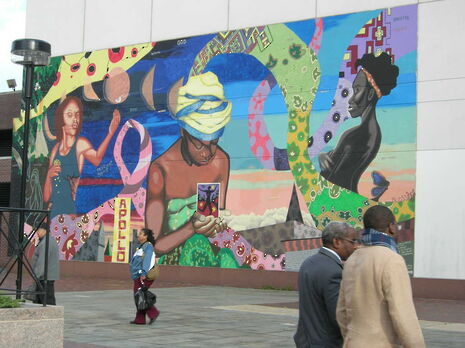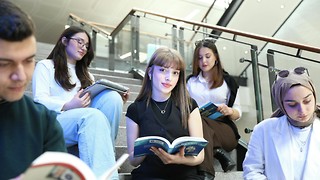Black and queer: culture, coolness, and visiblity
In his latest column, Jason Okundaye explores how visibility is often accompanied by assumed identities of ‘coolness’, and how this can be problematic for those wishing to break from the stereotype.

“Don’t know why ppl @ uni think I’m cool or think I think I’m cool, how many times must I reiterate that I lay in bed & cry all day” – tweet, sent March 1st 2017.
When did queerness and Blackness become the gold standards by which social value and ‘coolness’ are measured? Considering the turmoil of growing up constrained by the shackles of compulsory heterosexuality, it’s interesting that simply being Black and a ‘faggot’ suddenly means I’m poppin’.
I was never ‘cool’ in primary school. This was to do with my queerness, not my Blackness. Growing up I never thought much about the social value of my Blackness beyond engaging with my parents’ lessons about racism in Britain. But in primary school I was quickly identified as a ‘gay lord’. That wasn’t cool.
I remember when I was first marked by the stigma of ‘feminised’ boyhood – Year Two, following a P.E. lesson where my visible discomfort with football had me branded a ‘sissy’. I didn’t fit the conditions of masculinity and commitment to sporting excellence which constituted ‘coolness’ at school. I liked arts and crafts, books, and played with the girls at lunch time. The coolest boys were the ones who ran the 100m sprint the fastest and knew what the offside rule in Football was. They were not like me, and I was not like them.
In secondary school, ‘gay lord’ became ‘faggot’. The stakes were higher here as, in the boys’ school I attended, any indication of femininity was a signed confession to having played with penises and put them in your mouth – that wasn’t cool, that was punishable by mockery and social isolation. But it was here, however, that I became aware of the social value of Blackness.
“‘Coolness’, then, is defined by a proximity to culture and entertainment which may even be alien to you.”
In a sea of middle-class white boys from Surrey, the contingent of Black students were viewed as distinctive, representative of South London’s Black cultural identity. Whether it was in speaking slang, wearing beanie hats from the underground ‘tik-tok’ brand, or attending parties in council blocks, these elements of identity made them cool. I was never considered ‘cool’ like them because I walked funny, wasn’t social and didn’t fit the desired standards of masculine Blackness. Being queer, even in denial, negated my claim to Black coolness.
Once I’d left school, I was introduced to the idea that being Black and queer can be ‘cool’. I’ve recognised that ‘coolness’ for marginal identities is dependent on our interaction with mainstream social dynamics and popular culture. Sometimes just existing is enough. Going about your business whilst queer and Black is often taken as invitation for white, heterosexual gaze to scrutinise and commodify. It can take as much as walking down the street and the all-consuming gaze screams, “Honey, sissy that walk!”, “I. Am. Slayed.”, “Jason, you’re doing amazing sweetie.”
Everything about you is instantly fabulous, and every remark is instantly ‘shade’. My Black woman friends tell me of people’s obsession and amazement with their ‘trendy’ hair even if they themselves think they’re overdue a trip to the hairdressers. My Black male friends share in the fact that just wearing a cap can denote an unwarranted image of coolness. There is a certain fetishisation of ‘different’ bodies and the cultures we produce and supposedly represent which is strange, confusing and often dehumanising.
Starting university was a conflicting experience, because whilst I enjoyed freedom of sexual expression, it was accompanied by this scrutinising gaze. People love, and are obsessed with, difference. My lowest effort commitments to a queer aesthetic in painting my nails, and grinding on my friends listening to Vybz Kartel became a source of entertainment and spectatorship (although in equal parts hate and judgement). This identity which I had been forced to consider shameful and embarrassing for so many years was now a claim to coolness. Far from being exciting, it feels compromised.
The problem is that when cultures which were once resigned to the ghettos and underground gain mainstream attention, not only are they exploited by capitalism discovering an opportunity for profit, but many of us are then personally harassed or fetishised by culture vultures. Clothing, food, music, art, dance, people. These draw the gaze of white and heterosexual cultural observers who are met by the strange and unknown.

Exploitation of Black culture which enters the mainstream takes place on the capital level when entertainers such as Miley Cyrus, and recently Katy Perry use Black culture as a ‘come up’, appropriating the ‘twerking’, ostentatious displays of affluence and language, and then abandoning this once its commodity value declines. This translates into Black women being demanded to ‘twerk’ on demand and collecting no cheque from this ‘entertainment’ whilst White people profit.
Ball culture, an underground LGBT+ subculture, is another clear example. Black and Latinx queer and trans people in the 1980s and 90s, predominantly young, predominantly in Harlem, New York and predominantly rejected by their families, invented their own culture through the ballroom. Vogueing, drag and technical language such as ‘reading’ and ‘shade’ constituted this culture which was guarded and confined and viewed as a space for defiance, resistance and survival.
“This identity which I had been forced to consider shameful and embarrassing for so many years was now a claim to coolness.”
One need only scroll through Buzzfeed to discover the constant appropriation of queer Black and Latinx language such as ‘shade’ and ‘slay’ within mainstream culture. Once the hidden paradises of subculture are accessed, culture vultures commodify its most important aspects for commercial and social gain. Though I could not be further from Harlem ballrooms, the close relationship between Black queer identity and ball culture means that I’m viewed as a representative of its intricacies.
My claim to coolness, then, is based on a cultural identity I’ve taken no part in constructing. It is an odd case of being simultaneously hyper-visible simply because of your identity, and invisible because you are forcibly obscured by it.
‘Coolness’, then, is defined by a proximity to culture and entertainment which may even be alien to you. Many of my Black male friends have spoken about their lack of care for grime music, but report having being treated as banks of knowledge for the history of UK grime and having endured non-Black people attempting to impress them with their knowledge of Stormzy.
I am typically asked about the latest season of RuPaul’s Drag Race, despite never having watched it. “Because I don’t” isn’t seen as an adequate response to those who question why I don’t watch, and expect me to be inextricably linked to all things queer and popular. As mentioned in a previous column, being Black and queer is still an instant admission to certain sexual activities; the attachment of ‘coolness’ to my identity is simply based on the same narrative of assumption and commodification.
What’s ‘cool’ about Black and queer culture is dissolved once its cheapened and commercialised. But interestingly Black and queer people’s stake in this ‘coolness’ comes with conditions. ‘Coolness’ is also defined by being unbothered and temperate, so what happens when Black loses its ‘cool’ and resists silence and dominance? Black culture and queer culture were once viewed as challenges and disruptions to dominant mainstream narratives, but have in many ways been assimilated. What’s often expected in this integration is a drowning of our voices.
When I am visibly engaged in Black, queer things I can be seen as trendy and interesting. Everyone wants to be my friend and to use me as an accessory in a photograph. Once I open my mouth on racial politics this claim to ‘coolness’ in dominant white settings is cancelled, and I’m met either with social isolation or with overzealous praise about being “ground-breaking” or “inspiring”, “doing amazing sweetie”, once again.
When you don’t serve the dominant interests of capital and mainstream white attention, your social standing in white spaces is toppled. I’m more interested in gaining attention within queer Black spaces, but being at a predominantly white university means still having to tackle this burden of ‘coolness’. My relationship with ‘coolness’ while Black and queer may have developed since being a child, but what hasn’t changed is the interruption of unwanted gaze and my social value being defined by those who consider me as ‘other’
 Comment / The (Dys)functions of student politics at Cambridge19 January 2026
Comment / The (Dys)functions of student politics at Cambridge19 January 2026 News / Local business in trademark battle with Uni over use of ‘Cambridge’17 January 2026
News / Local business in trademark battle with Uni over use of ‘Cambridge’17 January 2026 Features / Exploring Cambridge’s past, present, and future18 January 2026
Features / Exploring Cambridge’s past, present, and future18 January 2026 News / Your Party protesters rally against US action in Venezuela19 January 2026
News / Your Party protesters rally against US action in Venezuela19 January 2026 Lifestyle / Seoul food19 January 2026
Lifestyle / Seoul food19 January 2026







